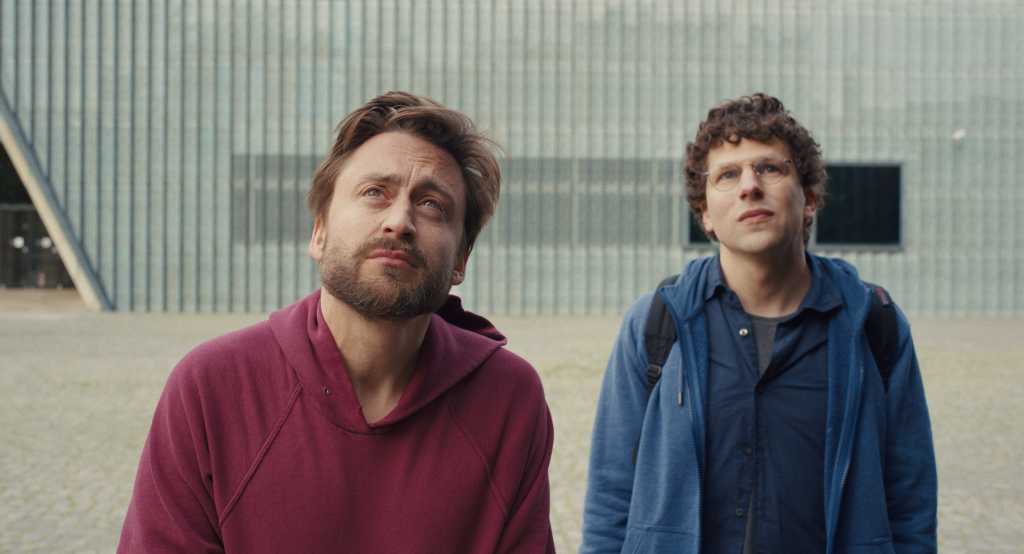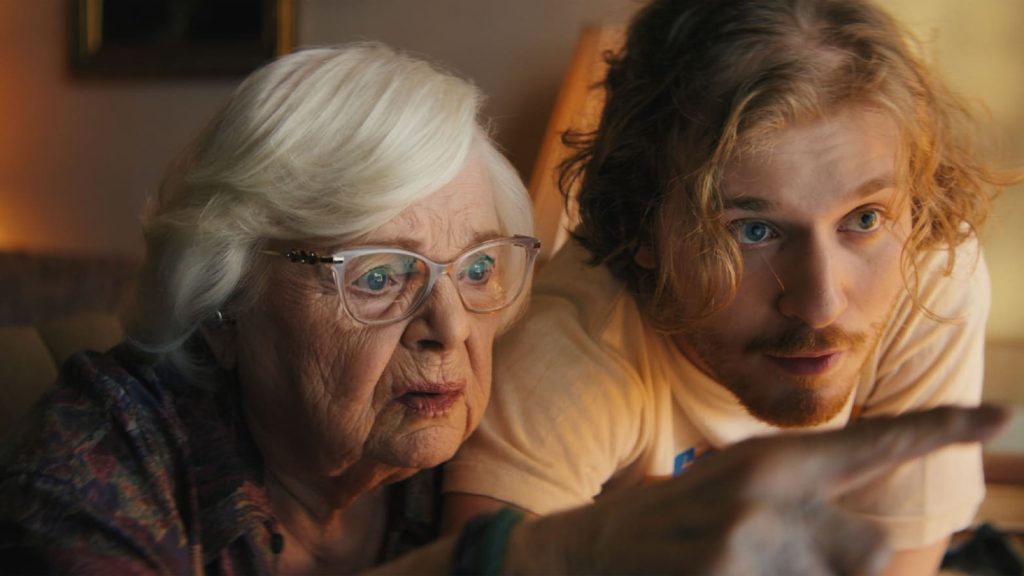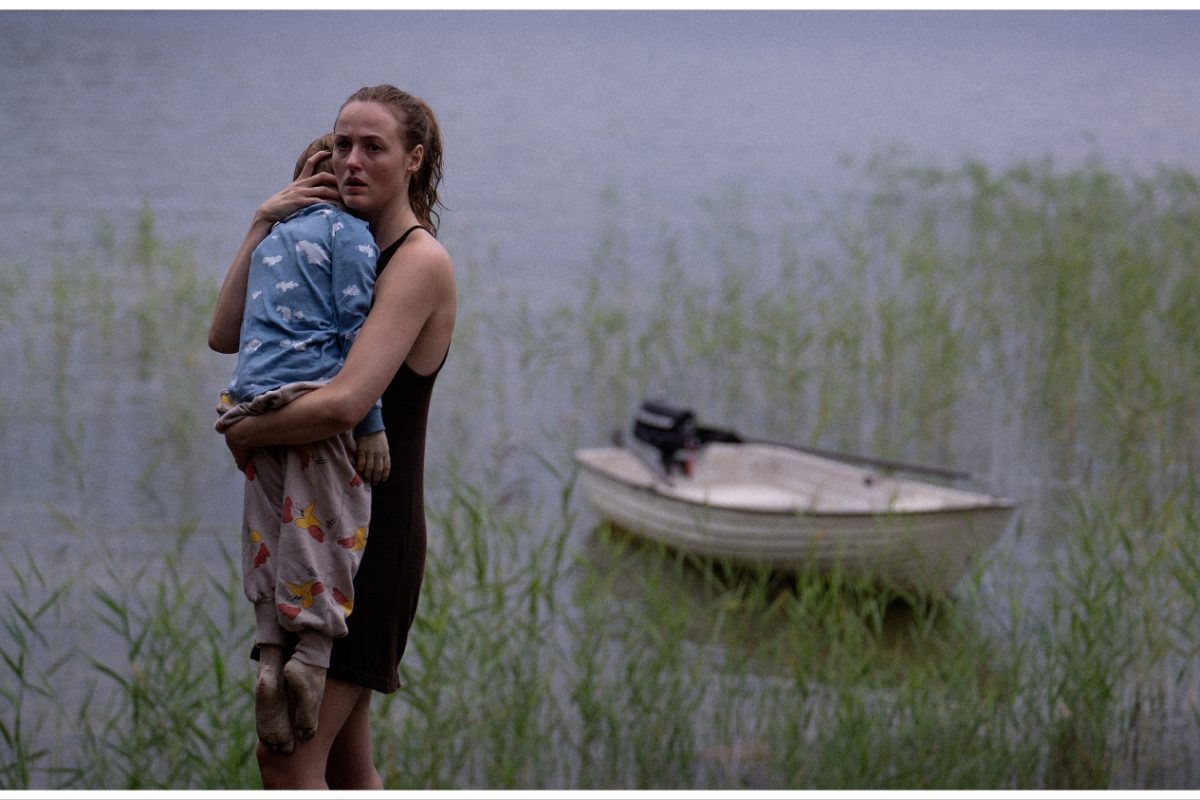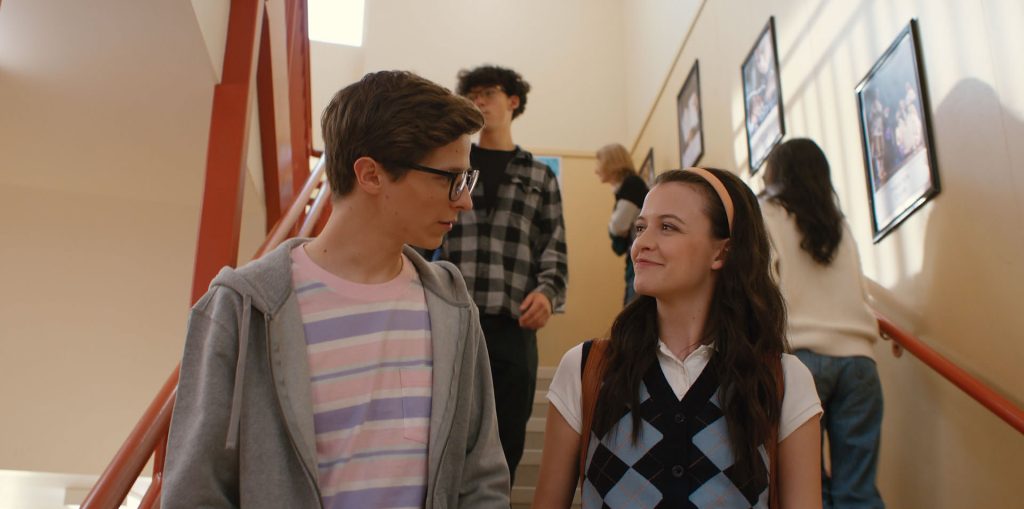This year, for the first time since 2012, I chose not to attend the Sundance Film Festival in person — a decision I took no pleasure in making, based entirely on the escalating costs of travel and accommodations, the exhausting work requirements of breaking even (to say nothing of actually coming out ahead), and the increasing impossibility of doing merely that. Of course, there was no in-person festival in 2021 and 2022; the festival was held entirely online, and this year, that was again an option (albeit with a smaller selection than in those years, or in last year’s hybrid version). So I did what I did then: I checked into a local hotel for a few days and binged.
One of my few complaints about the experience is that, for foreign films, the festival platform defaults to closed captioning rather than just English subtitles (some of us find captions distracting!). But it oddly enhances the experience of watching Handling the Undead, a Norwegian mash-up of arthouse drama and zombie movie from director Thea Hvistendahl; somehow, the cold simplicity of such on-screen text as “[Muffled knocks],” “[Flies buzzing],” “[Death screams],” and, most memorably, “[The sound of bones breaking]” renders such moments even more chilling.
The picture reunites The Worst Person in the World’s Renate Reinsve and Anders Danielsen Lie, though they disappointingly share no scenes. Hvistendahl and John Ajvide Lindqvist’s script intercuts three separate stories of families in grief, and the opening sequences are so anchored in reality that when the supernatural elements surface, they hit differently. Put simply, Handling the Undead wonders how it actually would go if your freshly deceased relative returned from the dead? Most zombie apocalypse movies give us only a minute or two of bewilderment and looming danger before the mayhem begins; this one takes place mostly within that minute or two, and works out plenty of variations to this clever conceit. Grade: A-
There’s a different kind of tension at play in the familial drama Good One. Lily Collias stars as Sam, a college-bound teen heading out for a hiking weekend in the Catskills with her dad (James Le Gros), his best friend (Danny McCarthy), and the friend’s teenage son. But the boy and his dad are fighting, so it turns into an awkward three-person trip, and writer/director India Donaldson finds her film in the specificity of the dynamics that are explored and worked over in the weekend that follows.
Collias (familiar from Palm Trees and Power Lines) is an excellent anchor, her exquisite, bone-dry line readings providing both laughs and clues into the doors that she does not casually open. Le Gros, forever an indie mainstay, does solid work in the most thankless role, while character actor McCarthy deftly displays how you might find this guy charming, before you knew better. Good One sneaks up on you, keenly observed and well-written (without sounding or feeling “written”), and its closing scenes are quietly devastating. Grade: B+

David Kaplan (Jesse Eisenberg) and his cousin Benji (Kieran Culkin) are an immediately apparent study in contrasts: David is a grown-up, with a real job and a wife and a kid, and Benji is still a teenager, wild and shaggy and irresponsible. They’ve reconnected to go on a “Heritage tour” through Poland at the behest of their recently-departed grandmother. Their deeply embedded prickliness is at the heart of A Real Pain, which Eisenberg also wrote and directed (as he did in Sundance ’22’s When You Finish Saving the World).
He finds copious opportunities to place these two in situations where that prickliness simmers — where Benji’s perpetual lack of social grace and filter embarrasses David, and tests their patience with each other. But the substance of their journey is never merely background, and Eisenberg gets the balance right, which is a tricky bit of business; he knows when to lean into the sentimentality, and when to deflate it. He’s also generous enough to write himself the straight-man role, allowing Culkin to do his most impressively thorny film work since Igby Goes Down. This is a modest picture, but a resonant one. Grade: A-
The witty voice-over and sly, funny sensibility of the opening scenes in Theda Hammel’s Stress Positions are a bit of a bait-and-switch; this is a movie with much more on its mind than the catty fun promised therein. The setting is Brooklyn, circa the summer of 2020, with everyone locked down and on edge; our primary focus is Terry (a perpetually frazzled John Early), who has taken over the trashed-out “party house” of the husband who’s just left him, and is quarantining with his 19-year-old nephew Bahlul (Qaher Harhash) a male model who was hit by an ambulance and is laid up with a broken leg.
Those are just two of the rich, fully realized characterizations; Hammel introduces a fairly full supporting cast, led by Hammel herself as Karla, Terry’s wildly, hilariously reckless best friend. Much of the interpersonal material here could play at any point in time, but Hammel’s early-COVID setting is a smart play, allowing her to easily and skillfully rack focus from the micro to the macro and back, creating a zonked-out vision of a world in a spiral. Grade: B

Thelma will generate plenty of ink upon its eventual theatrical release (and I do hope it gets one — this feels like a crowd-pleaser) as the first leading feature role for the great June Squibb, an invaluable supporting player who has previously stolen the likes of Nebraska and Hubie Halloween. And she’s terrific in the picture, as a 93-year-old woman who is conned out of $10,000 in a phone scam, and sets out to get it back; it plays, in its best moments, like a sly spoof of Taken and its ilk (the best moment being a truly gigantic laugh at the end, riffing on one of the most tired visual tropes of the genre).
But it also plays as a tribute to co-star Richard Roundtree, who passed last October after its production. He co-stars as an old friend who helps Thelma on her quest, and their scenes together have a genuine sense of two long lives, well-lived. All the threads of writer/director Josh Margolin’s script don’t quite come together (the B-plot with her slacker grandson isn’t nearly as compelling as the main narrative), but thanks to the skill of the performers, even the boilerplate scenes have real depth and feeling. Grade: B-
But the best film I’ve seen at Virtual Sundance thus far is Shuchi Talati’s Girls Will Be Girls, a modest but devastating coming-of-age drama set primarily at an Indian boarding school. Talati is dramatizing one of the oldest saws of the speciality, the good girl (Preeti Panigrahi) who falls for the sexy new boy (Kesav Binoy Kiran), and discovers, to her amazement, that something matters more to her than good grades and pleasing adults.
If the narrative is familiar, this is one of those “not what it’s about, but how it’s about it” situations, writ large. Girls is a marvelously lived-in movie; Talati’s writing and direction is so confident that within minutes, you feel as though you already know both of them, and the world they inhabit. That goes double for the girl’s mother (Kani Kusruti), who may be an ally in this relationship — or might, for knotty reasons of her own, prove a barrier. The curious, playful chemistry of the leads, and the cheerfully frank approach to matters of sex, make this one memorable enough, but what really brings it over is Panigrahi’s revelatory work. She’s endlessly sympathetic and charismatic, and handily holds the center of Talati’s excellent feature debut. Grade: A



